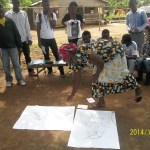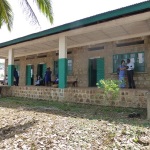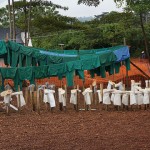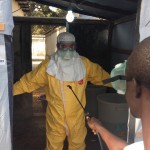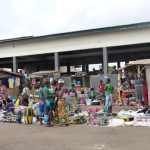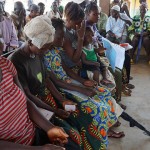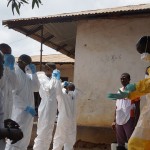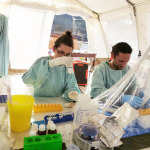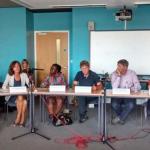The Ebola outbreak in West Africa has reinvigorated the debate about the role of ‘social mobilisation’ and ‘community engagement’, not only in response to devastating disease but a range of other intractable issues affecting Africa and the rest of the developing world. But what do we mean by ‘social mobilisation’? And why are we only learning now that community leadership is important? Sierra Leone’s communities are the true heroes of the Ebola response. Over the course of 18 months, a huge proportion of the population
Continue reading →
Some of the UK’s leading aid agencies’ prevention work, such as safe burials and awareness raising, in response to the Ebola epidemic in Sierra Leone is “impressive” but must continue to adapt to the changing situation in West Africa, an independent review of the DEC response said today. The Ebola crisis appeal response review conducted in March 2015 by the Institute of Development Studies for the DEC found that member agencies utilised their existing networks and relationships in Sierra Leone to scale up programmes after
Continue reading →
Dr. Ernest Bai Koroma, the president of the Republic of Sierra Leone, was having trouble “getting to zero,” and his underlings were getting antsy. “We need one more push,” said Major Palo Conteh, the commander of Sierra Leone’s National Ebola Response Centre (NERC) and a former Olympic quarter miler. “It’s like in the 400 meters when you’re 20 meters from the finish line, that’s the time to kick hard.” Brigadier General David Taluva, a jovial officer with the physique of a shot putter, had other
Continue reading →
Conflicting messages on the length of time that Ebola remains in semen after recovery make education and prevention confusing. We need to avoid mixed messages and focus on girls’ rights, says anthropologist Pauline Oosterhoff. When I met members of a women’s secret society in Sierra Leone this February, they proposed drastic measures to stop Ebola from spreading through sexual contact. All survivors should be quarantined for three months, they said. Male survivors need to be locked up because they cannot control their urge to have sex. Women
Continue reading →
The “selflessness of aid workers and medical volunteers” was praised both by the Queen in her Christmas message and by TIME magazine, who named ‘The Ebola Fighter’s their person of the year 2014. This emphasis on international staff, particularly doctors and nurses, gives a misleading impression about who is doing what in West Africa, and overlooks the huge contribution that national staff are making in their fight against ebola. Even when national staff are recognised, the focus again tends to be on the doctors and nurses, with some attention
Continue reading →
In December 2013, the West African Ebola epidemic began in a village near Guéckédou, a trading town in rural Guinea, but the disease wasn’t identified until February. The Guineans promptly notified health officials in neighboring countries, and in Liberia a team of researchers immediately set out for Lofa County, just over the border from Guéckédou, where a number of mysterious deaths had recently occurred. The Liberians at first assumed the deaths were caused by Lassa fever, a far less deadly disease with symptoms similar to
Continue reading →
Ebola’s reputation is fearsome. Its horrifying symptoms, quick human-to-human transmission, and exotic locale seem ready-made for a thriller movie. Indeed, in the midst of the largest Ebola virus outbreak ever, a real-time script is emerging. The story goes something like this: tribal habits, including archaic burial customs and a penchant for bush meat, have led to the emergence and spread of Ebola virus disease. The solution to the terrifying epidemic is to put patients in treatment centers, which are set up and staffed by foreign
Continue reading →
The American Anthropological Association / World Council of Anthropological Associations/ Wenner-Gren Foundation Emergency Initiative on the Ebola Outbreak, is bringing together anthropologists from around the world with expertise in Guinea, Sierra Leone, Liberia, and Nigeria, other Ebola-affected regions, and in infectious disease management for a workshop to address critical issues in the current Ebola outbreak. The workshop will generate a series of short briefing papers that provide actionable guidance to real-time actors in the field for how to proceed with technical, political, social, and economic
Continue reading →
Physicians, scientists, and public health experts shared their experience from the front lines of fighting Ebola virus disease in this symposium session presented at the American Society of Tropical Medicine and Hygiene (ASTMH) 63rd Annual Meeting in New Orleans. Speakers also discussed challenges and advances in methods of control and the promise of possible future solutions. Watch video here.
